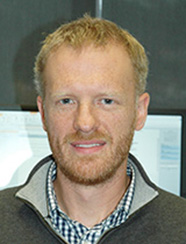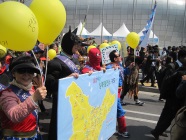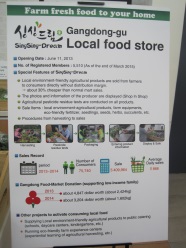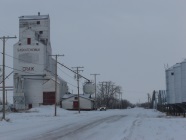 Senior Lecturer
Senior Lecturer
BA(Hons)(Guelph)
MA (N Br Col)
PhD(S Fraser)
Richardson Building, room 4C25
Office Hours: email to make an appointment
Tel +64 3 479 8771
Email sean.connelly@otago.ac.nz
Sean's background
Community response to sustainability challenges is a recurring theme in my teaching and research. My Masters research explored co-management arrangements between indigenous groups and government for sea turtle conservation in Suriname.
I completed my PhD in Geography at Simon Fraser University on community engagement for sustainable community development in 2009, based on case study research of urban, rural and First Nation community sustainability initiatives. I was able to research local food initiatives as a catalyst for sustainability through a post-doctoral fellowship with BC-Alberta Social Economy Research Alliance.
Prior to commencing PhD studies, I worked for ICLEI - Local Governments for Sustainability in the Johannesburg office in preparation for the World Summit on Sustainable Development.
In Dunedin, I am a member of Our Food Network whose mission is to stimulate the production, distribution and consumption of local food and in that way contributes to the building of a resilient and prosperous community.
I write a regular column “Seeds for Change” in the Otago Daily Times on food and sustainability
https://www.odt.co.nz/tag/seeds-for-change
Teaching
Sean also contributes to
- ENVI 311 Understanding Environmental Issues
- GEOG 102 Human Geography
- GEOG 285 Southern Landscapes
- GEOG 380 Field Research Studies (Arts)
- GEOG 397 Environmental Management
- HUMS 301 Internship Practicum
- HUMS 401 Internship Practicum
Research interests
The focus of my research is in the broad area of sustainable communities and how they contribute to the wider concept of sustainable development. In particular, I am interested in the gap between planning and policy development and local environmental action. I seek to develop this research by exploring three related themes:
1. Social economy and sustainable community development convergence - issues of scale Convergence of social economy and sustainable community development movements provide new opportunities for both theoretical and applied research on efforts to re-localize economies and strengthen the resilience and sustainability of communities and regions. I'm interested in how the convergence of these two movements might offer strategic opportunities to scale-up and scale-out these innovative approaches in cities and communities.
Convergence of social economy and sustainable community development movements provide new opportunities for both theoretical and applied research on efforts to re-localize economies and strengthen the resilience and sustainability of communities and regions. I'm interested in how the convergence of these two movements might offer strategic opportunities to scale-up and scale-out these innovative approaches in cities and communities.
2. Local food initiatives as catalysts for community transition
Over the last decade, interest in local food issues has arisen from a variety of sources. Environmental concerns,  organic food, health and nutrition, food security, food sovereignty, GMOs, food contamination and agricultural preservation have all been used to justify stronger connections between food production and consumption, ecological stewardship, social justice and community economic development. This research examines case studies of alternative food initiatives such as farmers markets, community gardens, CSAs and food hubs to explore the opportunities and barriers that exist in using food as a lens for broader transitions towards sustainability.
organic food, health and nutrition, food security, food sovereignty, GMOs, food contamination and agricultural preservation have all been used to justify stronger connections between food production and consumption, ecological stewardship, social justice and community economic development. This research examines case studies of alternative food initiatives such as farmers markets, community gardens, CSAs and food hubs to explore the opportunities and barriers that exist in using food as a lens for broader transitions towards sustainability.
I am also a member of Food Waste Innovation, a University of Otago Research Theme which measures food waste, develops reduction strategies, applies innovative technology, and works to modify producer and consumer behaviour.
3. Rural development and sustainability planning The future viability of many rural communities rests on their ability to manage the challenge of rural restructuring in the context of resource-dependent boom-bust cycles. For some communities privileged with recreational and tourism amenities, the shift from resource extraction to servicing recreation has been a source of growth. However, many other communities have had to rely on internal capacity and social capital as a means of coping with the loss of major industries. Still fewer have attempted to use sustainability as an amenity and focus for community development alternatives. This research seeks to examine rural communities that have turned to sustainability initiatives to cope with the loss of resource-based jobs to understand the relationship between community capacity, social capital, "can-do" attitude and sustainability as a strategy for community resilience.
The future viability of many rural communities rests on their ability to manage the challenge of rural restructuring in the context of resource-dependent boom-bust cycles. For some communities privileged with recreational and tourism amenities, the shift from resource extraction to servicing recreation has been a source of growth. However, many other communities have had to rely on internal capacity and social capital as a means of coping with the loss of major industries. Still fewer have attempted to use sustainability as an amenity and focus for community development alternatives. This research seeks to examine rural communities that have turned to sustainability initiatives to cope with the loss of resource-based jobs to understand the relationship between community capacity, social capital, "can-do" attitude and sustainability as a strategy for community resilience.
Potential postgraduate projects
I would welcome inquiries for any student interested broadly in community approaches to sustainability. Specific potential student projects I've identified include:
- Food system sustainability in New Zealand
- Exploring diverse futures of rural small towns in the South Island, NZ
- Exploring the role of social learning in collaborative management of fisheries in the East Otago Taiāpure
- Alternative food initiatives: Case studies in NZ
Current postgraduate supervision
PhD
- Danielle Du Plooy: Diverse meanings of land ethic in Aotearoa New Zealand
- Alyssa Ryan: Rural amenities and thriving regional economies (Co-supervised with Professor Etienne Nel and Dr Mike McKay – AgResearch)
- Alison Floyd: How dominant narratives of place shape socio-political-environmental policies on the West Coast of New Zealand (Co-supervised with Professor Etienne Nel)
- Tsani Rakhmah: Understanding the dynamic relationships of barriers to investment in low-carbon power generation: Case studies of geothermal power project development in Indonesia and New Zealand (Co-supervised with Professor Nathan Berg – Economics)
- Altami Arasty: Transnational climate change governance (Co-supervised with Professor Michelle Thompson-Fawcett – Geography)
Masters / Honours
- Charlotte Brewer (MSB): Alternative proteins potential to disrupt agriculture-environment relations (Co-supervised with Professor Hugh Campbell)
- Ellie Axton (MA): Motivations and approaches to local food system change
- Hannah MacDonald (MPlan): Social perspectives on waste management
- Tara Hagarty (MSc): Spatial conservation conflicts: Biodiversity and carbon (Co-supervised with Dr Ralf Ohlemuller)
Recent postgraduate supervision
PhD
- Abigale Virens: Seeing the city for the weeds: A genealogical exploration of foraging in Dunedin, New Zealand (2022: Co-supervised with Professor Hugh Campbell and Dr Hirini Tane)
- Katherine Cresswell Riol: Paying with Dignity: Neoliberalisation and the Human Cost of Food Charity (2021: Co-supervised with Dr Katharine Legun and Professor Hugh Campbell – Sociology)
- Garrett Lentz: Determining effective education strategies for sustainable food choice (2019: Co-supervised with Dr Miranda Mirosa – Food Science)
Masters / Honours
- Reese Martin (MIDP 2022): Exploring the potential for small scale solar energy in urban design
- Madison Seymour (MA 2021): Caring food systems? The transformational potential of ecological farming practices in New Zealand
- Sammy Bergen (MA 2021): The evolving economic geography of Central Otago (Co-supervised with Professor Etienne Nel)
- Elizabeth Boyle (MPlan 2021): Can city planning help address the need for food waste minimisation behaviour change in Dunedin's tertiary precinct?
- Jess McIntyre (MSc 2020): “Water we do about the river?” An integrated approach to understanding water quality in the Waikaka Stream, Southland, New Zealand (Co-supervised with Dr Sara Mager)
- Pailin Chua-oon Rinfret (MAppSci 2020): Cultural Impact Assessment in New Zealand (Co-supervised with Professor Michelle Thompson-Fawcett)
- Emily Cathro (Honours 2020): 'Just Transitions'? An investigation of Taranaki's energy and human future (Co-supervised with Professor Etienne Nel)
- Callum Ferguson (MA 2019): Therapeutic landscapes: Exploring Green-Blue spaces at the coast (Co-supervised with Dr Christina Ergler)
- Polly Brownlee (MA 2019): New Zealand's Industrial Hemp Industry: Potentials, constraints and futures
- Keith Finlayson (MAppSc Environmental Management 2019): Bridging the gap: Linking farm management plans to everyday practice
- Connie Mills (MPlan 2019): Using employment as a driver for economic development in a regional context
- Leigh McKenzie (MSc 2018): Environmental priorities of local food producers
- Philippa Mackay (MPlan 2016): Food Resilience in Dunedin
- Jessica Rose (MPlan 2016): Economic development on the West Coast (Co-supervised with Professor Etienne Nel – Geography)
- Jessica Pullen (MSc 2015): The effect of drought on West Coast dairying (Co-supervised with Dr Sarah Mager – Geography)
- Kathleen Haylock (MPlan 2015): Local food systems planning in Dunedin and Christchurch: A comparative case study
- Alejandra Parra Mūnoz (MPlan 2014): Community planning in North East Valley, Dunedin
- Carrie Skilton (PGDipAppSc - Environmental Management 2014): Non-notification for oil and gas exploration and best practice in Environmental Management (Co-supervised with Dr Sophie Bond)
- Ihakara Puketapu-Dentice (MPlan 2013): Ngā Tapuwae o ngā Mātua Tūpuna – The Footprints of our Ancestors – The Role of Indigenous Culture in Promoting Development and Design in the Urban Environment - Insights from Vancouver and Waiwhetū (Co-supervised with Associate Professor Michelle Thompson-Fawcett)
Publications
Detoni, M., Allan, A., Connelly, S., Summerfield, T., Townsend, S., & Shephard, K. (2024). University teachers’ perspectives on student attendance: a challenge to the identity of university teachers before, during and after Covid-19. Educational Research for Policy & Practice. Advance online publication. doi: 10.1007/s10671-024-09375-6 Journal - Research Article
Cresswell Riol, K. S. E., & Connelly, S. (2023). Beyond a neoliberal critique of hunger: A genealogy of food charity in Aotearoa New Zealand. Agriculture & Human Values. Advance online publication. doi: 10.1007/s10460-023-10414-w Journal - Research Article
Seymour, M., & Connelly, S. (2023). Regenerative agriculture and a more-than-human ethic of care: A relational approach to understanding transformation. Agriculture & Human Values, 40, 231-244. doi: 10.1007/s10460-022-10350-1 Journal - Research Article
Chua-oon Rinfret, P., Connelly, S., & Thompson-Fawcett, M. (2022). Practising impact assessment: A content analysis of 20 Cultural Impact Assessment reports in Aotearoa New Zealand. AlterNative, 18(1), 155-162. doi: 10.1177/11771801221085290 Journal - Research Article
McIntyre, J., Mager, S., & Connelly, S. (2022). Can catchment groups fill the democratic deficit? Catchment groups as a hydrosocial phenomenon in Waikaka, Southland. New Zealand Geographer, 78, 76-86. doi: 10.1111/nzg.12323 Journal - Research Article